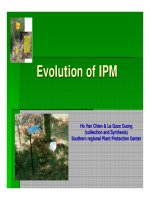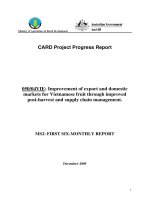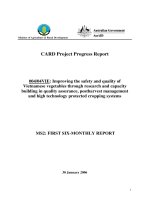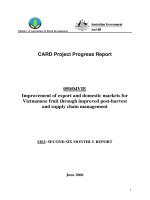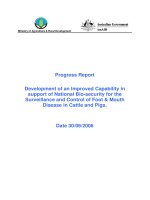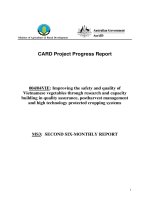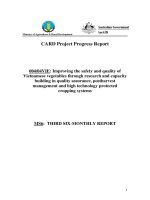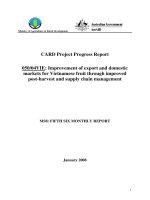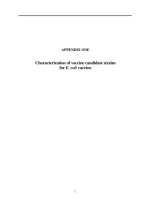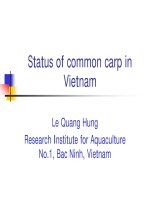Báo cáo nghiên cứu khoa học " Improvement of export and domestic markets for Vietnamese fruit through improved post-harvest and supply chain management - Milestone Report 4 " pptx
Bạn đang xem bản rút gọn của tài liệu. Xem và tải ngay bản đầy đủ của tài liệu tại đây (86.75 KB, 23 trang )
1
Ministry of Agriculture & Rural Development
Milestone Report 4
Improvement of export and domestic
markets for Vietnamese fruit through
improved post-harvest and supply chain
management.
CARD Project 050/04VIE
Milestone Report 4
Date June 2008
1
Table of Contents
Institute Information 2
Project Abstract 4
Executive Summary 4
Introduction & Background 5
Methodology, techniques and training material for supply chain analysis and development in Southern Vietnam for
mango and pomelo 6
Created and constructed supply chain maps for mangos and pomelo 7
Validation of strategic plans developed for mango and pomelo 7
Smallholder Benefits 14
Capacity Building 15
Publicity 16
Project Management 16
Report on Cross-Cutting Issues 17
Environment 17
Gender and Social Issues 19
Implementation & Sustainability Issues 19
Issues and Constraints 19
Options 20
Sustainability 21
Next Critical Steps 21
Conclusion 22
2
Institute Information
Project Name Improvement of export and domestic
markets for Vietnamese fruit through
improved post-harvest and supply chain
management.
Vietnamese Institution Southern Sub-Institute of Agricultural
Engineering and Post-Harvest Technology
(SIAEP)
Vietnamese Project Team Leader Mr Nguyen Duy Duc, M. Eng.
Australian Organisation Queensland Department of Primary
Industries and Fisheries (DPI & F)
Australian Personnel Mr. Robert Nissen
Dr. Peter Hofman
Mr Brett Tucker
Mr. Roland Holmes
Date commenced September 2006
Completion date (original) May 2008
Completion date (revised) December 2008
Reporting period Milestone Report 4
3
Contact Officer(s)
In Australia: Team Leader
Name: Mr. Robert Nissen Telephone: +61 07 54449631
Position: Project Leader Fax: +61 07 54412235
Organisation Queensland Department of
Primary Industries and Fisheries
(DPI & F)
Email:
In Australia: Administrative contact
Name: Michelle Robbins Telephone: +61 07 3346 2711
Position: Senior Planning Officer
(Emerging Technologies)
Fax: +61 07 3346 2727
Organisation Queensland Department of
Primary Industries and
Fisheries (DPI & F)
Email:
In Vietnam
Name: Mr Nguyen Duy Duc, Telephone: +84 (8) 8481151
Position: Director SIAEP Fax: +84 (8) 8438842
Organisation Southern Sub-Institute of Agricultural
Engineering and Post-Harvest
Technology (SIAEP)
Email:
4
Project Abstract
Executive Summary
Methodology, analytical techniques and training material for supply chain analysis and
development in Southern Vietnam for mango and pomelo were provided in April 2006. Supply
chain maps for mango and pomelo were constructed with the Vietnamese project participants.
Strategic Plans were developed during April 2006 and refined during following visits via
consultation and further data collection of industry statistics.
Baseline surveys were also conducted for mango in Tien Gien and Khanh Hoa provinces and for
pomelo in the Vinh Long Province. In total, over 120 farmers, 30 collectors and 20 wholesalers
were interviewed by the Vietnamese collaborators to obtain vital information on how the mango
and pomelo supply chains are operating.
Initial fact finding and surveys indicate that Good Agricultural Practice (GAP), Integrated Pest
Management IPM and Integrated Disease Management IDM issues are the largest issues affecting
fruit quality in both mango and pomelo supply chains. GAP manuals are being developed based
on current, and newly developed Asian GAP principles. Initial drafts of manuals have been
completed for Mango Cultivation Handbook, Mango Pest Control Handbook, Mango Disease
Handbook and Pomelo Cultivation, Pest and Disease Control Handbook, and further development
of manuals was completed in January 2008. Post-harvest handbook for mango was being
developed in collaboration with SIAEP and SOFRI staff.
Workshops have been conducted using participatory action learning processes to enhance the
knowledge of SIAEP and SOFRI staff. Workshops were conducted on:
• developing an understanding of how supply chains function
• developing supply chain maps on product movement, information and monetary flows
The fruit industry in Vietnam has a great potential and plays an important role in
agricultural production. In 2003, Vietnam exported US$43 million of high value fruit to
high-income countries and imported US$14 million of fruit and vegetables. Vietnam is
experiencing difficulties in competing with other Asian nations in export markets and its
own domestic market, especially with China and Thailand. This suggests that Vietnam’s
horticultural industries require substantial development to be globally competitive.
Vietnamese consumers are demanding safer and higher quality fruit. This project has
identified key pre and post-harvest technology gaps that reduce product quality, safety
and consistency. Targeted training programs are focusing on the total supply chain and
are providing benefits by helping to implement quality management systems and GAP
systems at the village level providing greater employment for the farming community.
This project embraces the five CARD strategies for rural development; and in particular;
strategies to increase production and competitiveness of agricultural systems; reduce
poverty and vulnerability, and increase stakeholder participation whilst ensuring
sustainability.
5
• a strengths, weakness, opportunity and threats (SWOT) analysis
• a supply chain process analysis, that identified problems and solutions for mango and
pomelo supply chains
• developing strategic and action plans for mango and pomelo supply chains
During April 2006, workshops were also held in villages with mango and pomelo growers and with
collectors to discuss supply chain maps, the SWOT analyses and strategic plans. This enabled
adjustment to the plans developed at earlier workshops, and allowed support and input from a
wider cross section of farmer/growers. Information from all of these sources was then used to
develop the final industry mission statements, strategic and actions plans. These objectives will be
implemented during this project.
The Objective, Reflective, Interpretive, and Decisional analysis (ORID) system was used to
evaluate the effectiveness of the workshops. Fifty percent of the workshop participants understood
workshop concepts very well, while the remaining 50 percent said they were satisfied with their
understanding of workshop concepts. Eighty three percent of the group indicated they would be
confident in using these concepts with other supply chains and this training fulfilled their
expectations.
Benefits to grower/farmer involvement in the workshops and training exercises has been shown
through one group being stimulated into proactively addressing and developing new harvesting,
handling and packaging systems which improved their first grade pack out percentage by 10%,
thus providing greater socio-economic benefits to the village and the wider community.
Introduction & Background
Ford et al., (2003) analysed the constraints to the competitiveness of fruit industries in Vietnam and
identified:
• poor unstable product quality
• no quality standards
• poor post harvest technologies
• poor pre-harvest practices
• lack of group co-operative marketing structures
• little information about supply chains and prices and customers needs.
Stakeholder/beneficiary analysis of fruit crops in the Mekong delta showed that both mango and
pomelo (with 33 000 ha and 9 000 ha respectively) are very important fruit crops in Southern
Vietnam. The objectives of this CARD project 05/04 VIE are to:
• Improve pre-harvest technologies to produce high quality mango (integrated pest
management, integrated crop management, fruit fly control, maturity indices, reduced
pesticide residues, better environmental and human health, etc)
• Improved mango and pomelo post-harvest technologies (eg cool chain management,
packaging, post-harvest dipping, ethylene ripening, waxing, washing and wetting agents,
quality assurance)
6
• Improved quality standards and quality assurance programs for mango and pomelo.
The approach and methodologies developed for these crops through this project will be
applied to other fruits and vegetables.
• Mapping of current supply chains to domestic and selected export markets, with
particular emphasis on determining consumer preferences and needs, and reporting
results back to farmers.
• Provide a better understanding and possible improvements of the supply chain by
Vietnamese fruit industries for mango and pomelo.
This CARD project fills capacity gaps and reduces major weaknesses in pre-and post-harvest
technologies affecting product quality consistency and supply chain management and planning.
Highly specialised targeted training programs and research appropriate for institutions and industry
stakeholders were provided to complete this CARD Project 05/04 VIE Milestone 4.
CARD Project Milestone 4 focused on the development of supply chain training workshops and
manuals. These manuals were translated into Vietnamese. Participatory action learning and
farmer’s extension school activities were conducted for trainers in Southern Sub-institute of
Engineering and Post-harvest Technologies (SIEAP) and Southern Fruit Research Institute
(SOFRI) and for mango and pomelo supply chain participants (retailers, wholesalers, transporters,
collectors and farmers). These were delivered as per the project objectives. These workshops
and manuals were developed by the Department of Primary Industries and Fisheries (DPI&F) in
collaboration with the University Of Queensland (UQ) and the collaborating Vietnamese’s
institutions of SIAEP and SOFRI. As per the milestone 4 schedule the team provided:
o Methodology, analytical techniques and training material for supply chain analysis and
development in Southern Vietnam for mango and pomelo
o Created and constructed supply chain maps for mangos and pomelo with the Vietnamese
participants
o Developed strategic plans for mango and pomelo with the Vietnamese participants
Implementation Highlights
Methodology, techniques and training material for supply chain analysis and
development in Southern Vietnam for mango and pomelo
The Australian team members developed the methodology, training techniques and new training
material (CARD Project manuals and supply chain analysis processes) based on processes and
manuals previously developed by:
• Qld DPI&F for two International ACIAR (Australian Centre for International Agricultural
Research) Projects
• Australian Government, New Industries Development Program, Department of Agriculture,
Fisheries and Forestry Australia, Supply Chain Management in Agribusiness Learning
from Experience Workbook
• Australian, National Food Industry Strategy, Food Chain Capability Development Program
Workbooks:
o Facilitator Reference Manual
o Participant Resource Manual
7
o Value Chains, Chain Awareness, The Competitive Edge, Participant Workbook
A manual for strategic planning, supply chain analysis and mapping was developed and supplied to
all participants who attended the training schools (See Appendix A). A training process (Detailed
Session Plan) was specifically developed based on this manual (See Appendix B). This detailed
session plan was developed to assist trainers in conducting these training workshops. Examples
of process analysis sheets were also developed and supplied (See Appendix C). Theses manuals
and training guide were specifically developed to assess the mango and pomelo industries in
Southern Vietnam and can be easily adapted for other commodity groups in Vietnam.
Create and construct supply chain maps for mango and pomelo
Three Australian team members travelled to Vietnam in April-May 2006 to conduct capacity
building exercises and run a series of 6 workshops on strategic planning and analysis of existing
supply chains and development of new supply chains. These workshops used participatory action
learning processes and capacity building for SIAEP and SOFRI staff to develop:
• supply chain maps for both mango and pomelo
• conduct a strengths, weakness, opportunity and threats analysis
• carry out a supply chain process analysis
• develop strategic plans for mango and pomelo supply chains for participating CARD
project members.
(See Appendix C)
CARD Project members participating in these workshops were SIAEP and SOFRI staff, farmers,
collectors, traders, wholesalers and marketers etc., (See Appendix D). All were involved in a
participatory action learning process (farmer type schools) to develop the supply chain maps, carry
out SOWT analyses and develop the strategic plans. All members participated in the supply chain
process analyse. See Appendix E for supply chain maps and SWOT analysis.
The following CARD workshops in 2006 and 2007 built upon these strategic plans and a deeper
analysis of the existing supply chains was undertaken. New supply chains were developed and
trials conducted on these new chains to assess their socio-economic benefits to local farmers
through the use of improved postharvest techniques, practices and management systems.
Validation of strategic plans and action plans developed for mango and
pomelo
Workshops were also held in villages with mango and pomelo growers (see Appendix F) and with
collectors to discuss supply chain maps, the SWOT analyse and strategic plans developed at
previous workshops and to adjust and obtain input from a wider cross section of farmer/growers.
This consultative and participatory action learning approach (farmer schools) are designed to
empower the rural poor in the decision making processes.
Based on the agreed vision, goals and future direction for both the mango and pomelo CARD
project participants developed action plans based on the strategic plans. These action plans for
both the mango and pomelo supply chains aligned with this CARD Project objectives. Therefore,
8
the action plans developed indicate the project activities and project direction for the next 2 years
(2007-2008).
Baseline Surveys
Supply chain baseline surveys were conducted by SIEAP and SOFRI staff for mango in Tien Giang
and Khanh Hoa Provinces and for pomelo in the Vinh Long Province. Mango and pomelo
production for the relevant regions revealed:
• Mango
o South East Vietnam:- 18 685ha producing 70 622 tonnes annually
o Mekong Delta:- 22 001ha producing 193 383 tonnes annually
o Khanh Hoa Province:- 5 800ha producing 18 800 tonnes annually
• Pomelo
o South East Vietnam:- 1 422ha producing 12 932 tonnes annually
o Mekong Delta:- 8 298ha producing 108 916 tonnes annually
About 20% of Vietnam’s population live in the Mekong Delta Region with 85% living in rural areas.
About 80% of rural farms range in size from 0.5 to 2ha. The lower poverty line defined by
Vietnamese General Statistics Office (GSO) is; expenditure per capita required for securing a
minimum nutritional requirement (2100 calories per day). Therefore, the poverty rate below the
lower limit calculated by the (GSO) in 2003 showed that the total poverty percentage for each
Vietnamese region where this project is operating is:
• Mekong Delta 23.7%
• South Central Coast 25.9%
These percentages are lower than Vietnam’s average poverty rate of 28.85 percent. The only
other region to record a poverty rate below this is the Red River Delta region (22.4%).
The rural poverty rates have the similar trends and are:
• Mekong Delta 26.56%
• South Central Coast 31.27%
In total, over 120 farmers, 30 collectors and 20 wholesalers were interviewed by the Vietnamese
collaborators to obtain vital information on how the supply chains for mango and pomelo are
functioning in Vietnam. Surveys were conducted at the end of the project for document
comparisons and benefits obtained. These will be presented in Milestone Report 10.
Survey data was presented at the first workshop during the second project trip in April-May 2006.
Information obtained was then used in subsequent workshops to develop models of the supply
chains for mango and pomelo in Vietnam, and to develop the strategic plans for mango and
pomelo.
Brief Summary of Mango Baseline Survey Information
• Total Mango area and production for the South East is 18 685 ha producing 70 622
tonnes/year, Mekong Delta Region 22 001ha producing 193 383 tonnes/year and Khanh
Hoa Province 5 800ha, producing 18 800 tonnes/year.
• Vietnamese consumers regard the “Cat Hoa Loc” as the number one variety in Vietnam.
9
• In the Mekong Delta, about 72% of mango fruit are transported from farm to collector by
boat, but in Khanh Hoa Province 100% are via some form of road transport. Farmers,
collectors and wholesaler believe that only 1-2% of fruit is damaged during transport in 30
to 50 kg bamboo baskets or crates.
• In the Mekong Delta a small percentage of mango is graded at the farm level but most fruit
are graded and sorted at the collector and then again at the wholesaler level in the supply
chain. In contrast, for Khanh Hoa Province, about 54% of farmers grade their fruit.
• In the Mekong Delta there are three basic grades, Class 1:- 420-500g, Class 2:- 300-420g
and Class 3:- <300g, whilst in Khanh Hoa there are also three grades, Class 1:- 1-3
fruit/kg, Class 2:- 4-6 fruit/kg and Beer class >6 fruit /kg. Fruit grading is carried out by
eye. Improvement and standardisation of quality standards as well as adoption by all
participants in the supply chain is need.
• Most fruit are sold hard green, ripe fruit are not wanted.
• Collectors/farmers prefer to sell mixed grades even though the farm gate price will be low.
This is done to allow collectors/farmers to sell Class 3 fruit which they could not normally
sell. On the other hand many wholesalers find it extremely difficult to sell Class 3 fruit.
This adds significant costs to all aspects of the supply chain and affects farmers/grower
returns.
• Selling price for fruit:- Majority of farmers obtain the price of fruit locally. This is achieved
by asking as many collectors, farmers and wholesalers as possible at the district level for
their price paid or received for fruit sold.
• Price is usually set and established with farmers on day of sale or the day before and
based on the market supply on any given day.
• The majority of farmers do not know the price of mango at the HCMC wholesale market.
• Wholesalers reported that most fruit will keep for 4 days with out the use of special storage
facilities. Presently, there are no storage facilities located the HCMC wholesale markets
for wholesalers to use).
• At the wholesaler point in the supply chain, once the fruit is mature, for each day that it is
not sold, traders will reduce the price by 500-10 000 vnd/kg.
Brief Summary of Critical Pomelo Baseline Survey Information
• In the Mekong Delta, the Vin Long Province is considered as the leading growing region in
Vietnam for Pomelo.
• Total area and production in the Southeast is 1 422ha, producing 12 932 tonnes/year and
for the Mekong Delta Region 8 298ha producing 108 916 tonnes/year.
•
The pomelo variety “Man Roi” is considered the number one variety in Vietnam.
• There are as many as 2 to 4 grades/standards of fruit depending upon market and time of
season. Each class grade standard changes, based on early season production, mid-
season and late-season production. For example, Vin Long local market there are 2
classes/grade standards, Hoang Gia Company uses 3 classes or grade standards and the
wholesale market in HCMC 4 classes or grade standards.
• In the Mekong Delta, about 62% of pomelo fruit are transported from farm to collector by
boat, and then 66% of fruit transported by road to HCMC and the remainder (34%) by boat
in 80 to 85kg bamboo baskets.
• Of the total production from Vin Long Province it is estimated 5% to 6% is for local
consumption. In 2004, Metro Cash and Carry marketed 145 tonnes of pomelo fruit. Also
10
in 2004, 50 tonnes of pomelo was exported to Germany. In 2005, a 100 tonnes was
exported to Germany and Russia and the price was US Dollars Freight On Board Ho Chi
Minh City $590USD/tonne (about 9 200VND/kg).
11
Industry Mission Statements and summary of strategic plans
Mango
Maintain stable incomes (prices) and consistent access to good markets by improving pre-and
post-harvest practices, QA standards, obtaining a balance between supply chain partners, and
investment in infrastructure so that consistent quality and quantity is supplied to our customers.
Pomelo
Develop production/post-harvest and marketing practices that will provide the right quality and
quantity of fruit to our markets (export, domestic and processing), consistently and for the long-
term.
Mango Strategic Plan (Summary)
Skills & Technology Infrastructure Information Other
1. Improve production
process (e.g. follow
GAP)
(5i,5v)
Priority 1
3. Need handling
equipment (coldroom,
packhouse and
transportation)
(1i,1v)
7. Need market
information for export
and domestic
markets
(4i, 3v)
Priority 3
10. Government
needs to set
standards for
maximum residue
levels
(0i,0v)
2. Ensure true variety
& improve variety
(3i,1v)
8. Need to know
standards required by
customers
(3i,2v)
11. Government to
help with planning
and development for
specialised fruit
growing area
(2i,3v)
Priority 5
4. Improve packing
and storing
procedures
(2i,0v)
5. Need technical
support to improve
storing, packing and
packaging material
(2i,3v)
Combined as
Priority 4
9. Need info services
like internet
(3i, 1v)
12. Need to improve
the linkages between
farmers – traders –
customers. Scientists
and government also
need to be involved.
(4 links)
(4i,4v)
Priority 2
6. Post-harvest
handling, chemicals
and storage
(1i,1v)
Mango Improvements under key headings with votes (i- Industry Personnel, v- Vietnamese Research Institution
Personnel): All criteria are detailed in Appendix A with votes for each criteria.
Top 5 Priority for Strategic Plan:- Listing in Order of Importance for Mango Industry
1. Improve production process (e.g. follow GAP)
12
2. Need to improve the linkages between farmers – traders – customers. Scientists and
government also need to be involved.
3. Need market information for export and domestic markets
4. Improve packing and storing procedures/Need technical support to improve storing,
packing and packaging material
5. Government to help with planning and development for specialised fruit growing area
Pomelo Strategic Plan (Summary) Domestic Markets
No WHAT (Problems) WHY SOLUTIONS/IMPROVEMENTS
GROWERS
1 Lack of information
& technology on
seeds, farming
techniques, etc.
No one to contact, little
information transferred
Supporting techniques from seedling –
farming-harvesting (Guidance for GAP)
(5i,6v+2i,2v) +point 4
Priority 1
2 Lack of capital Difficult policy of loan Supporting capital/investment in
infrastructure
(6i, 0v + point 13) Priority 2
3 Advice/counsel on standards/specifications
of products
(0i, 6v) Priority 3
4
Abuse of
pesticides/chemicals
Lack of knowledge
No guidance/ instruction
received from technicians
Training on IPM
(2i, 2v) combined with 1
TRADERS
12 Poor quality products Collecting from small-scale
farmers
Intensively farming & programming
production area – monoculture (1i, 4v)
Priority 4
13 Weakly competitive
capability to other
traders & companies
Lack of information Investment of
infrastructure/facilities/human resources
(3i, 0v)
Export Markets
No WHAT (Problems) WHY SOLUTIONS/IMPROVEMENTS
TRADERS
23 Poorly post-harvest
handling
Lack of modern technology Improving applicability of farming
techniques and technologies of
harvesting, packing and transporting. (0i,
4v) Priority 5
Pomelo key areas with votes (i- Industry Personnel, v- Vietnamese Research Institution Personnel): All criteria are
detailed in Appendix A with votes for each criterion.
13
Top 5 Priority for Strategic Plan:- Listing in Order of Importance for Pomelo Industry
1. Supporting techniques from seedling –farming-harvesting (Guidance for GAP)
2. Advice/counsel on standards/specifications of products
3. Intensively farming & programming production area
4. Training on IPM
5. Improving applicability of farming techniques and technologies of harvesting, packing and
transporting
14
Workshop evaluations
The ORID system was used to evaluate the effectiveness of the workshops. ORID stands for
Objective, Reflective, Interpretive, and Decisional. Both Vietnamese industry and institute staff
were surveyed at the end of our workshop and a summary presented below.
The workbooks and materials supplied to participants and translation of these workshops into
Vietnamese showed that 55% found them very useful, while the remaining 45% found them highly
useful. Fifty percent understood workshop concepts very well, while the remaining 50% said
satisfactory. Eighty three percent of the group indicated they would be confident in using these
concepts with other supply chains and this training fulfilled their expectations while 100% indicated
they would like further training. This has been carried out in the 2 and 3 year of this CARD Project.
Smallholder Benefits
Farmer groups in the CARD project have now show greater initiative by looking for new
approaches to solving problems. For example in the 2 and 3 years of this project:-
• A group of mango grower/farmers have been stimulated into proactively addressing and
developing new and improved harvesting methods.
o They have implemented new handling and packaging systems.
o This group have now invested in a pack house and equipment (grading system,
hot water treatment tank for disease control, sorting tables and packaging to
improve the saleability and shelf life of their product.
• This group have signed a 70 tonne contract with Metro.
• A group of pomelo grower/farmers have also invested in a pack house and developed a
new sorting and grading system.
o Fruit are now washed, sanitised, dried and wrapped to improve shelf life.
o This group have invested in equipment such as washing and sanitising tanks,
vacuum wrapping machines.
o This group will expand the size of their pack house and build a cool storage facility
to increase the self life of their product. They are now exporting 10 tonnes of
pomelo per month to Europe.
• This group have exported and sold 10 tonnes of pomelo per month to the Netherlands and
Europe.
This CARD project has empowered and provided greater socio-economic benefits to several
mango and pomelo groups and their wider community.
The mango cooperative has increased Class 1 fruit sales by more than 10% but are still worried
that they do not have enough product to fill large orders which may be greater than 10 tonnes per
month. This mango group have applied for VietGAP accreditation. They are now in the final stage
of obtaining that accreditation.
The pomelo group will export 20 by 40 foot containers to Netherlands and Belgium this year. They
have obtained Global GAP accreditation version 2.
15
These new harvesting methods grading, sorting, handling and packaging techniques and GAP
systems developed have proven highly successful for these groups and are being carried out the
cooperative level. Fruit are marketed under the groups own trademarks. This has highlighted the
benefits of have both public and private sector involvement in such projects and how ordinary
farmers can become leaders of change and build capacity at the local level.
These examples show how farmer and collaborators input into strategic planning and the
development of GAP pre- and post-harvest systems are essential if adoption and implementation is
to be achieved. These groups are now identifying the problems and the solutions based on their
guidance and advice for Vietnamese CARD project trainers. This project has helped these groups
develop higher value supply chains and improve product quality whilst they operate in a
private/commercial situation.
Capacity Building
During April-May 2006 for 14 days 6 capacity building workshops on strategic planning, supply
chain mapping and analysis and development of new supply chains were undertaken by the
Australian team of Mr Nissen and Mr. Hofman of DPI&F and Ms. Rankin of UQ.
During this visit by the Australian team, a trip was also undertaken from 10:00pm to 3:00am to the
HCMC Wholesalers Markets to observe fruit quality, trader operations wholesale market operation
and to discuss issues with wholesale market staff. Further visits to Ho Loc Cooperative and
Pomleo Growers and collectors were also undertaken.
Workshop 1 was carried out to train SIAEP and SOFRI staff and to discuss processes to be used
in further workshops on strategic plan development, supply chain mapping, supply chain process
analysis, workshop evaluation methods and project action plan development. Input from SIAEP
and SOFRI staff on the processes used to train Vietnamese supply chain CARD Project
participants was sought and given. Their input was vital and helped provide highly successful
training workshops. A trainer’s workbook and workshop manuals developed by the Australian
team were provided to each participant.
Workshop 2 was for the CARD project supply chain participants (grower/farmers, cooperatives,
collectors, traders, wholesalers and marketers, etc). Each workshop participant was trained using
participatory action learning methods. This workshop enhanced their knowledge of:
• how supply chains function and develop maps of product movement, information flows,
monetary flows
• an audit of strengths, weakness, opportunity and threats (SWOT analyses) on the supply
chains
• develop strategic plans for mango and pomelo supply chains and this CARD project.
Workshop 3, 4 and 5 were carried out at the village grower/farmer collector level. Each participant
was trained using participatory action learning methods. SIAEP and SOFRI staff were trained in
supply chain process analysis and conducted these process analyse at each workshop undertaken
16
with these groups. These workshops provide additional training in the processes used during
Workshop 2 and subsequent field days. They were to:
• confirm the accuracy of information obtained during Workshop 2
• obtain additional information about commercial practices, quality loss etc.
• confirm whether the proposed strategic plan is accurate and appropriate
Workshop 6 was to:
• develop and discuss how to implement the relevant sections of the action plan developed
from the strategic plan
• plan the activities for years 2 and 3 of the project in view of the requirements of the action
plan
Following workshops in November 2006, July 2007 and September 2007 built upon the strategic
plans and developed new value chains for the mango and pomelo industries in Southern Vietnam.
Project staff at both SIAEP and SOFRI have now increased their involvement in developing new
high value chains and GAP standards for mango and pomelo farmer groups in Southern Vietnam.
Publicity
Mr Nissen presented a paper at the ISHS Conference on ‘Improving the performance of supply
chains in the transitional economies', Sofitel Plaza Hotel, Hanoi, Vietnam, 23-27 September, 2007
on “Development of new processes for evaluating and implementing new improved horticultural
supply chains operating in the transitional economies of South-East Asia”.
This paper focused on the new processes, techniques and analysis methods of supply chains
develop for this CARD Project by Mr Nissen and the project team. Participator action learning
(PAL), participant training participants (PTP), collaborative survey and process analysis, SWOT
and gap analysis, test of fit, end to end, integrity and simplicity testing practices were also
discussed as methods to analyse existing supply chains and develop new supply/value chains.
This paper highlight how these management practices will help farmers and other supply chain
participants deliver; improved product quality, assist in chain group investment in elite product
lines, implementation of new value chain practices for domestic and international markets,
trademarks that distinguish their product on quality and food safety, improved product packaging
and future investment in cool storage facilities to ensure product quality is maintained.
This paper was highly regarded and very well received by the conference participants who made
many comments on how this paper bought a business analysis approach to the analysis and
development of new improved supply chains.
Project Management
Close linkages with the joint RMIT and DPIF project staff working on Quality Assurance Systems
for ASEAN Fruit and Vegetables (QASAFV) have continued. Exchange of information has
occurred on a regular basis. The information exchanged covered areas such as:
• product quality concepts
17
• development of ASEAN GAP standards
• supply chain development and evaluation processes
During the January-February 2008 visit by Mr Nissen, Director Nguyen Duy Duc and Mr Nissen
made direct linkages to between the CARD Project 050/04 VIE and the ASEAN Secretariat South-
South Cooperation Project and A-J partnership Project, funded by MAFF Japan Mr Nissen
provided training and workshop material to the ASEAN training course that was developed for the
CARD project to train SIAEP, SOFRI, farmers, collectors, wholesalers and retailers. Previous
CARD project training and material assisted SIAEP staff to conduct this ASEAN training course.
There has been one change to the Australian Project team. Ms Marlo Rankin left the Australian
project team at the end of the second year of the project.
Extension to the project finish date was sought and obtained via email. This was due to:-
• two vital staff members from SIAEP resigning, Mrs Tran Thi Ngoc Diep, Mr Nguyen
Chi Trung
• two key members Mr Le Minh Hung and Mrs Nguyen Vu Hong Ha leaving to
undertake further training and study in New Zealand for three years
• and the passing of Professor Luu Trong Hieu.
Further absences that have impacted upon this CARD project, are the two resignations of key staff
from SOFRI (Mr Do Minh Hien and Mrs Thai Thi Hoa) leaving to take up new jobs.
This has seriously impacted upon the CARD project in terms of achieving milestone outcomes in
the desired time frame (September 2008). Two vital project activities impacted upon are:
• socio-economic studies of mango and pomelo
• pomelo and mango post harvest enhancement of shelf and reduction in fruit quality
using enhanced post harvest methods.
We have now undertaken measures to place the project back on track.
Experiments and data collection and analysis is now well underway and should be completed by
30
th
of October 2008.
Report on Cross-Cutting Issues
Environment
As previously reported, many environmental issues were identified during consultation with
grower/farmers during the participatory action learning workshops. Even now, towards the end of
this CARD project, many farmers still feel these will impact heavily upon they ability to achieve
GAP accreditation in the future. The issues of concern are:
• contamination of irrigation water (disposal of grey water and by product contamination of
waterways)
• agricultural spray application methodology and practices
• type and amount of fertiliser, their application methods to reduce environmental
contamination
18
• mixed farming methodology and cultural practices (mixed plant and animal farming
practices)
Irrigation and Water Management Practices
Water plays several roles in agricultural cropping systems. Irrigation scheduling (when and how
much water to apply) is critical and coupled with water scheduling and soil water monitoring
provides and efficient and effective use of water. Mango and pomelo plants require water at critical
times and these are:-
• flowering and fruit set
• fruit development and
• vegetative growth phases
Therefore, monitoring of soil water is essential to eliminate excessive plant stress at these critical
times. Excessive moisture stress (drought) or over-watering can affect cropping capacity and
product quality as well as nutrient and pesticide runoff into the environment. Good farm and
orchard design is essential to ensure any runoff is trapped on farm. This is an essential element of
GAP. There are no incentives or subsidies and farmers/growers are forced to provide these costs
out their own pocket, reducing their viability even though there are wider social, ecological and
environmental benefits, such as reduced incidences of contractible diseases, cleaner environment
(fewer pollutants) and a healthier life for the community from such practices.
Agricultural Chemical Usage
Ministry of Agriculture and Rural Development Department (MARD) Plant Protection unit have
documented that farmers and other pesticide users usually ignore the risks, safety instructions and
essential protective measures in using chemicals. Records showed that 11% of all poisonings in
the country are due to pesticides: approximately 840 poisonings in 53 cities and provinces in 1999
in Vietnam. Surveys conducted by the Plant Protection Department have shown that 80% of
farmers in the South of Vietnam consider pesticide application the essential component of the
production system compared with other control practices.
On farm chemical management involves many aspects:
• types of chemical (formulations)
• mode of action (contact or systemic)
• their availability
• purchasing (amounts and cost)
• on farm storage
• application methods
• rates of application and calculating of rates
• disposal
• safe handling and application practices
• withholding periods for marketing purposes
• market access issues etc
Incorrect use of pesticides in the tropics can also lead to aggravated problems in pest control due
to the year round growing season and their constant ability to develop resistant strains faster then
their counterparts in the subtropical and temperate zones.
19
Whilst many farmer/growers have received IPM training their application and adoption on farm has
been lacking due to compounding factors that occur at the farm level.
Even though these environmental issues are not strictly part of this CARD project we are providing
some training on orchard design, water and soil conservation methods. Far greater emphasis will be
placed on delivering IPM and IDM methods. This will be in consultation with our Vietnamese
partners. This project aims to deliver for mango and pomelo an assurance system that will deliver a
safe clean product that meets Asian GAP standards.
Gender and Social Issues
The project is aware of the need to incorporate, encourage and support the role of women as
members of cooperatives. Very few represented both as general members and even less at a
management level. This is an ongoing challenge facing cooperative development as in general,
households will join as members of the cooperative, but female member of the household will only
attend meetings if her male partner is unable. However, it has been recognised that women play a
variety of roles at all levels of both mango and pomelo supply chains and encourage the
involvement of women in this project.
Women are heavily involved in the post-harvest marketing and sale of fruit. They represent the
majority of collectors, wholesalers, traders and retailers in both local and HCMC markets, so further
upstream training should be designed to address these roles and encourage their participation by
the Vietnamese institutes. Many of these women provide valuable insights to marketing of fruit and
customer requirements.
The Vietnamese project team is still represented with women making up the majority of the team
from SOFRI and SIAEP. They play key roles in project implementation experimental design and
data collection. The SOFRI team is still lead by two experienced scientist and extensionist Dr.
Hung and Dr Hang who is committed to the professional development of female staff. A number of
young female scientists from both institutes have take on key responsibilities as part of this CARD
project.
The only Australian female team member has now left this CARD project to take a new position.
Implementation & Sustainability Issues
Issues and Constraints
At the Grower/Farmer level:
Standardised harvesting practices will be difficult to implement for both mango and pomelo. When
prices are high, grower/farmers will harvest immature fruit to take advantage of high prices (market
supply and demand curves:- high demand = increased prices plus low supply = small quantity
available). Convincing grower/farmers to stick to standards when market prices are high and to
establish a name or their trademark or brand will be extremely difficult.
20
Fruit grade standards for mango will be difficult to implement, particularly when current practices by
grower/farmers who selling mixed fruit classes (Class 1 to Class 3) in the same baskets. They see
quantity as the primary indicator of money returns to farming as opposed to fruit quality being the
primary indicator of increased farm returns.
Many grower/farmer have received IPM training but found it extremely difficult to implement and
many revert back to previous practices. Training is often carried out in other regions and no
demonstrations are carried out on farms in their locality. Calender spray regimes are used to
control pests and diseases and these do not suit local environmental conditions being experienced
when sprays have to be applied, e.g. rain.
All grower/farmers have experienced severe difficulties in implementing GAP. Significant problems
raised were during workshop and discussions centred on issues such as:
• pollution of irrigation water
• intercropping (citrus and cash crops under trees)
• animals (chickens) running loose in the orchards
• difficulties in applying sprays
• fruit bats are a causing significant problems
• fruit fly is also a problem
• bacterial spot is increasing in severity and affecting more orchards each year
All growers have found that they have limited resources (capital/money) to implement GAP and
access to capital via low interest rate loans to implement GAP principles are non existent. This
makes undertaking GAP practices extremely difficult for grower/farmers. Low returns on crops
grown, and no available capital, means that improvement will only occur at an extremely slow rate.
Many grower/farmers will remove crops that are unprofitable or difficult to manage and grow.
Grower/farmer may expect is that handouts from the project, but this is not the case. This project
is designed to build their confidence by improving their ability through capacity building exercises to
solve problems and implement solutions that will provide increased returns.
At the collector, trader and wholesaler level:
Standardised and fruit grade standards will be difficult to maintain due to grading being carried out
by eye.
Options
Development of grade standards for both pomelo and mango was undertaken via consultation with
grower/farmers, collectors, traders and wholesalers. Grade standards were developed and will
continue to be reviewed and modified by this CARD Project team and each Cooperative involved in
this project. Increased returns may not come immediately as these new supply chains fight for
existence with older more established chains. Once chains establish a presence, and consumers
experience superior quality product from these chains, benefits will come (demonstrated by the
Hoa Loc Mango Cooperative which increased grade one fruit by 10%).
21
During this CARD Project, training in IPM and IDM will be and has been provided at the local level.
• how to conduct and carry out monitoring for pest and disease
• identification of type crop damage
• identification of pest and disease causing crop damage
• when and how to spray
• on farm chemical management (as indicated above in 6 Report on Cross Cutting Issues,
Environment Agricultural Chemical Usage)
• and implementation of GAP principles
Sustainability
This project has addressed sustainability issues through
• participatory action learning process involving CARD project supply chain participants
(grower/farmers, collectors, traders, wholesalers, exporters) section of champions or
industry leaders.
• train the trainer workshops of SIAEP and SOFRI project staff who now have capability to
expand methodologies and process used in this project to other industries
• workshops that provide information on GAP, IPM and IDM principles and linking these to
other CARD Project (Dragon Fruit) and AADCP project.
• providing background information on the benefits of health and safety, environmental and
social impacts of implementing GAP, IPM and IDM methods in new pre- and post–harvest
practices
• establishing supply chain maps for product, communication and monetary flows,
infrastructure and skills audits
• undertaking process analysis to determine problems and obtain input from participants on
solution to problems encountered in the supply chains
• undertaking surveys on quality and survey to assess improvements being implemented
• developed new improved supply chains, pre-harvest and post-harvest techniques to
maintain mango and pomelo product quality
Several sustainability problems do arise they are being addressed by the project through
participatory action learning process and this project is making good progress in addressing issues
above. One issue of concern and highlighted by many growers and involves financial assistance.
The project team members believe that some of these issues can be addressed through
development of grower financial training project and government assistance through special
schemes set up to assist farmers implement GAP principles.
Next Critical Steps
These have been grouped under the following categories based on strategic plan priorities and are
as follows:
• Develop and implement GAP, focussing initially on pest and disease management (IPM)
22
• Improving applicability of farming techniques and technologies of harvesting, packing and
tansporting.
• Reducing post-harvest losses by establishing a demonstration of production, sorting,
packing and transport systems to provide the quality required by selected better retail
outlets
• Improve linkages between growers, traders, customers, scientists and government also
need to be involved.
• Develop high value supply chain
• Improve practices to provide high quality fruit
• Re cycle orchards as a long term plan to provide high quality fruit
For a complete breakdown of the CARD project critical steps see the Mango and Pomelo Action
Plans outlined in Appendix C.
Conclusion
This project is still receiving support and a high level of commitment from all the project participants
(grower/farmers, collectors, traders, wholesalers, exporters, Vietnamese Institutes (SIAEP and
SOFRI) and Australian staff involved.
Information gathering and surveys methodologies undertaken have proven to be highly
successfully in obtaining an understanding of the Vietnamese mango and pomelo supply chains
and have identifying problems areas and possible solutions.
Significant progress has been made on documenting the supply chain for mango and pomelo and
excellent progress in implementing the strategic and action plans for mango and pomelo.
SIAEP and SOFRI have committed and provided staff for implementation of the mango and
pomelo action plans and strategic plans that will ensure the objectives of the CARD project are
met.
